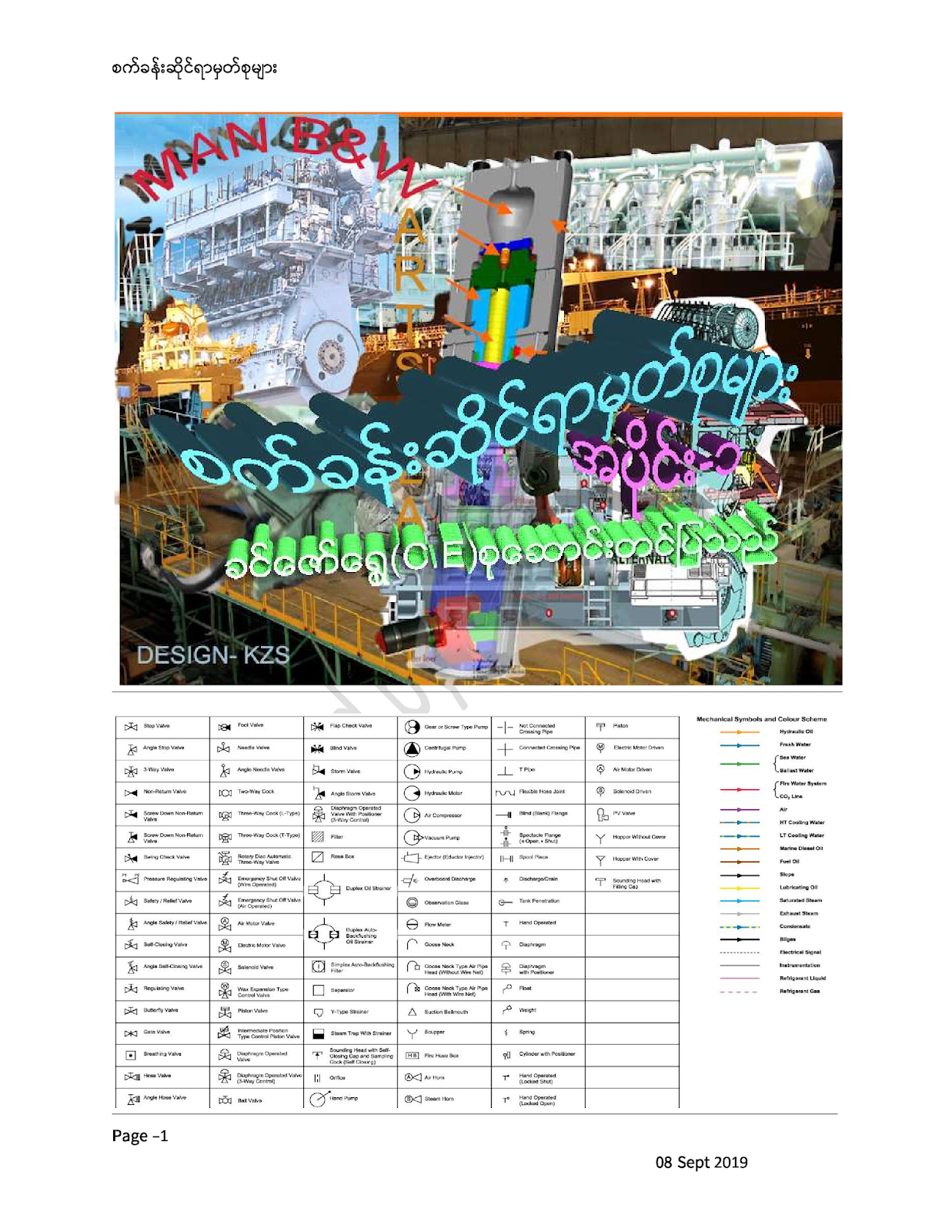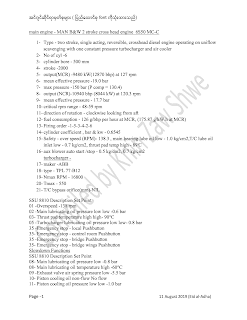ေမၚတါေတြကို အေပၚကလိုအမ်ိဳးအစါးခြဲလို႔၇ပါတယ္။ပထမဆံုး AC
Polyphase ( 3 Phase ) က induction & synchronous ကို ေလ႔လါသင္႔ပါတယ္။
Induction motor မွာ wound rotor & squirrel cage rotor ဆိုၿပီးထပ္ခြဲပါတယ္။
Squirrel cage rotor က စက္ခန္းထဲအသံုးအမ်ားဆံုးၿဖစ္ၿပီး rotor မွာ
ေၿကးဘါးေခ်ာင္းေတြၿမွဳပ္ၿပီး(အၿကမ္းဖ်င္းၿမင္သါေအါင္ေၿပာ၇င္) ထိပ္၂ ဖက္က ေၿကးကြင္းနဲ႔
ေ၇ွာ႔တိုက္ထါးတါပါဘဲ၊ ဒါေၿကာင္႔ ေမၚတါ၇ဲ႔ stator က transformer primary winding နဲ႔တူၿပီး
rotor က transformer secondary winding ကို ေ၇ွာ႔တုိက္ထါးတါနဲ႔တူတယ္လို႔ေၿပာၿကတါၿဖစ္ပါတယ္။
AC single phase induction
motors
A.C single phase induction motors ေတြဟါ သူဟါ သူ
မလည္နုိင္ဘဲ ၇ိုတါကိုလွည္႔ေပးမွစလည္ပါတယ္။ ဘါလို႔လဲဆိုေတါ႔ သူ၇ဲ႔ clockwise torque
= anti clockwise torque
ၿဖစ္ေနလို႔ၿဖစ္ပါတယ္။
သူကိုလည္ေစၿခင္၇င္ starting wire ( fine wire of high
resistance and low reactance ) ကို series ထည္႔ေပး၇မွာၿဖစ္ပါတယ္။ အဲဒီ၀ိုင္ဒင္၇ဲ႔
angle of lag <main winding angle of lag ၿဖစ္လို႔ rotating magnetic field
၇ၿပီး စလည္နိုင္ပါတယ္။ေမၚတါ္စပိ ၇၅% ေ၇ာက္၇င္ ဗဟိုခြါအါးခလုတ္နဲ႔
ၿပဳတ္သြ့ါးပါတယ္။အခ်ိဳ႔ကလဲ STARTING WIDING မွာ ကက္ပက္စီတါ စီး၇ီး ဆက္ၿပီး
နိုႈးၿကပါတယ္။
AC 3 phase induction
motors
ပိုလီေဖ႔ဆိုတဲ႔သံုးသြင္ေဖ႔ induction motor ေတြက self
starting ၿဖစ္ပါတယ္။ ၀န္ေပၚမူတည္ၿပီး လည္နွဳန္းက်တတ္ပါတယ္။ alternator stationary
armature နဲ႔ဆင္တဲ႔ stator ၇ိွပါတယ္။
Stator - အဲဒီ stator ကို 3 phase supply ေပးတဲ႔အခါ rotating
magnetic field (constant in magnitude and rotating at the same angular
frequency as that of the supply voltage) ေပၚလါပါတယ္။
There are no slip rings or any DC excitation
supplied to the rotor. Instead, the AC current in the stator induces a voltage
across an air gap and into the rotor winding to produce rotor current and
associated magnetic field.The stator and rotor magnetic fields then interact
and cause the rotor to turn
credit to [Frank_D._Petruzella]_Electric_Motors_and_Control_
A three-phase motor stator winding consists of
three separate groups of coils, called phases, and designated A, B, and
C. The phases are displaced from each other by 120 electrical degrees and
contain the same number of coils, connected for the same number of poles. Poles
refer to a coil or group of coils wound to produce a unit of magnetic polarity.
The number of poles a stator is wound for will always be an even number and
refers to the total number of north and south poles per phase.
Typical connection of coils for a four-pole, three
phase Y-connected induction motor.
credit to [Frank_D._Petruzella]_Electric_Motors_and_Control_
credit to [Frank_D._Petruzella]_Electric_Motors_and_Control_
SQUIRREL CAGE MOTOR –
Squirrel cage rotor -
၇ိူတါက ေၿမာင္းေတြထဲမွာ single stout copper conductor
ထည္႔ထါးပါတယ္။ဟိုဘက္ဒီဘက္အစြန္း၂ဖက္မွာ copper ring ေတြနဲ႔ short
လုပ္ထါးပါတယ္။အဲဒီ ၇ိုတါေၿကးေခ်ာင္းေတြထဲ စီးတဲ႔ လ်ပ္စီးက control လုပ္လို႔မ၇ပါဘူ။
An induction motor rotor can be either wound rotor
or a squirrel cage rotor. The majority of commercial and industrial
applications usually involve the use of a three-phase squirrel-cage induction
motor.
A typical squirrel-cage induction motor
credit to [Frank_D._Petruzella]_Electric_Motors_and_Control
The rotor is constructed using a number of single
bars short-circuited by end rings and arranged in a hamster-wheel or
squirrel-cage configuration.
When voltage is applied to the stator winding, a
rotating magnetic field is established. This rotating magnetic field causes a
voltage to be induced in the rotor, which, because the rotor bars are
essentially single-turn coils, causes currents to flow in the rotor bars. These
rotor currents establish their own magnetic field, which interacts with the
stator magnetic field to produce a torque. The resultant production of torque
spins the rotor in the same direction as the rotation of the magnetic field
produced by the stator. In modern induction
motors, the most common type of rotor has cast-aluminum
conductors and short-circuiting end rings.
ေမၚတါ၇ဲ႔ စေတတါ၀ိုင္ဒင္ကို ဗို႔ေပးလိုက္ေတါ႔ ၃ သြင္
လ်ပ္စီးမို႔လို႔ လည္ေနတဲ႔ သံလုိက္စက္ကြင္းတခု စေတတါမွာေပၚလါပါတယ္။squirrel case
motor ၇ဲ႔ စေတတါ ၀ုိင္ဒင္ကို ထ၇န္စေဖၚမါ တလံုး၇ဲ႔ primary winding
တခုအေနနဲ႔ယူဆၿကပါတယ္။ rotor winding ကိုေတါ႔ ေ၇ွာ႔တု္ိက္ထါးတဲ႔ secondary winding
တခုအေနနဲ႔ယူဆထါးၿကပါတယ္။ ထ၇န္စေဖၚမါ စကင္ဒ၇ီ၀ိုင္ဒင္ၿဖစ္တဲ႔ ၇ိုတါမွာ ညိဳ႔၇
သံလုိက္စက္ကြင္းတခုေပၚလါပါတယ္။အဲဒီ ၇ိဳတါစက္ကြင္းက
စေတတါသံလုိက္စက္ကြင္းနဲ႔တြန္းဆြဲလုပ္ၿပီးေတါ႔ torque တခုေပၚလါတယ္။အဲဒါ၇ဲ႔လါး၇ာက
စေတတါ၇ဲ႔ လည္ေနတဲ႔သံလုိက္စက္ကြင္းနဲ႔ လါး၇ာတူပါတယ္။
The resistance of the squirrel-cage rotor has an
important effect on the operation of the motor. A high-resistance rotor
develops a high starting torque at low starting current.
A low-resistance rotor develops low slip and high
efficiency at full load.
motor torque
varies with rotor speed for three NEMA-type squirrel-cage induction motors:
NEMA Design B —Considered a standard type with normal starting
torque, low starting current, and low slip at full load. Suitable for a broad
variety of applications, such as fans and blowers, that require normal starting
torque.
NEMA Design C —This type has higher than standard rotor
resistance, which improves the rotor power factor at start, providing more
starting torque. When loaded, however, this extra resistance causes a greater
amount of slip. Used for equipment, such as a pump,
that requires a high starting torque.
NEMA Design D —The even higher rotor resistance of this type
produces a maximum amount of starting torque. This type is suitable for
equipment with very high inertia starts such as cranes and hoists.
Squirrel cage motor ေတြ characteristics
sychronous speed နားနီးပါး constant speed
နဲ႔လည္တယ္။starting current 5 -6 ဆေလါက္၇ိွတတ္တယ္။ ပါ၀ါလုိင္း ၂
ေခ်ာင္းေၿပာင္းေပး၇င္ေၿပာင္းၿပန္လည္တယ္။လည္ေနတံုး phase တၿကိုးၿပတ္ခဲ႔၇င္ က်န္တဲ႔
လိုင္းေတြက ကါး၇င္ကို ၂ ဆေလါက္ဆြဲလိမ္႔မယ္။အိုဗါဟိၿဖစ္မယ္။ေမၚတါက synchronous
speed နားေလါက္မွာ slip တခု နဲ႔လည္မယ္။အဲဒီ slip
ကေမၚတါကိုလွည္႔ေပးေနတါၿဖစ္တယ္။တကယ္လို႔ field လည္သေလါက္ rotor လည္၇င္ rotor &
field ၿကား relative motion မ၇ိွေတါ႔လို႔ no voltage induced ၿဖစ္မယ္။rotor က
rotating magnetic field of stator ကို slip ၿဖစ္လို႔သါ volt & current က
၇ုိတါမွာ ညိဳု႔ယူတါၿဖစ္တယ္။
Percent slip =100 x (synchronous speed – actual
speed)/synchronous speed
slip က
load မ်ား၇င္လိုက္မ်ားတယ္။အဲလိုမ်ားမွ useful torque ၇မယ္။ ၆၀ ၿကိမ္နွုန္း သံုးသြင္
ေမၚတါေတြ၇ဲ႔ ပံုမွန္ slip က ၂ ကေန ၃ ၇ာခိုင္နွဳန္းေလါက္၇ိွတတ္တယ္။
ေနာက္ induction motor တမ်ိဳးက wound rotor induction
motor (slip ring motor လို႔လဲေခၚပါတယ္)ၿဖစ္ပါတယ္။အ၇င္ကေၿပာခဲ႔သလို squirrel cage
motor ၇ဲ႔ ၇ိဳတါလ်ပ္စီးက ထိန္းလို႔မ၇ပါဘူး။ wound rotor induction motor ၇ဲ႔
၇ိဳတါက ကြိဳင္ပတ္ၿပီး ထိပ္မွာ slip ring နဲ႔ဆံုးထါးလို႔ အၿပင္ကေန resistance
ကစါးေပးနိုင္လို႔ ၇ိဳတါလ်ပ္စီးကိုထိန္းနိုင္ပါတယ္။စနိဳးခ်ိန္ starting resistor
ကိုၿဖတ္ခုိင္းလို႔ low starting current & high starting torque
၇ပါတယ္။အ၇ိွန္၇လါ၇င္ resistance ကိုေလ်ာ႔ခ်ပါတယ္။ဒါေၿကာင္႔ squirrel cage motor
starting current က ပံုမွန္လ်ပ္စီးထက္ ၅ ဆေလါက္လိုေပမဲ႔ wound rotor induction
motor ဆို၇င္ ၂ ဆေလါက္ဘဲလိုပါတယ္။
credit to [Frank_D._Petruzella]_Electric_Motors_and_Control
The
wound-rotor induction motor (sometimes called a slip-ring motor) is a variation
on the standard cage induction motors. Wound-rotor motors have a three-phase
winding wound on the rotor, which is terminated to slip rings. The operation of
the motor can be summarized as follows.
• The
rotor slip rings connect to start-up resistors in order to provide current and
speed control on start-up.
• When
the motor is started, the frequency of current flowing through the rotor
windings is nearly 60 Hz.
• Once
up to full speed, the rotor current frequency drops down below 10 Hz to nearly
a DC signal.
• The
motor is normally started with full external resistance in the rotor circuit
that is gradually reduced to zero, either manually or automatically.
• This
results in a very high starting torque from zero speed to full speed at a
relatively low starting current.
• With
zero external resistance, the wound-rotor motor characteristics approach those
of the squirrel cage motor.
•
Interchanging any two stator voltage supply leads reverses the direction of
rotation.
A
wound-rotor motor is used for constant-speed applications requiring a heavier
starting torque than is obtainable with the squirrel-cage type. With a
high-inertia load a standard cage induction motor may suffer rotor damage on
starting due to the power dissipated by the rotor. With the wound rotor motor,
the secondary resistors can be selected to provide the optimum torque curves
and they can be sized to withstand the load energy without failure. Starting a
high-inertia load with a standard cage motor would require between 400 and 550
percent start current for up to 60 seconds.
Starting
the same machine with a wound-rotor motor (slip-ring motor) would require
around 200 percent current for around 20 seconds. For this reason, wound rotor
types are frequently used instead of the squirrel-cage types in larger sizes.
Wound-rotor
motors are also used for variable-speed service. To use a wound-rotor motor as
an adjustable-speed drive, the rotor control resistors must be rated for
continuous current. If the motor is used only for a slow acceleration or high
starting torque but then operates at its maximum speed for the duration of the
work cycle, then the resistors will be removed from the circuit when the motor
is at rated speed.
In
that case they will have been duty cycle–rated for starting duty only. Speed
varies with this load, so that they should not be used where constant speed at
each control setting is required, as for machine tools.
လ်ွပ္စစ္
ေမၚတါနဲ႔ ပန္ကါလွည္႔တဲ႔ လ်ပ္စစ္ သေဘါၤေတြမွာ သံုးၿကတါက 3 phase synchronous
motor ပါဘဲ။ ေနာက္ ၿပီး 4 stroke engine သံုး cpp propulsion မွာ redundancy
propulsion အေနနဲ႔ shaft generator ကို ေမၚတါေၿပာင္းၿပီးပန္ကါကိုၿပန္လွည္႔၇င္လဲ ဒီလို
ေမၚတါမ်ိဳးပါဘဲ။(PTO & PTH လို႔ေၿပာၿကပါတယ္။ PTO ဆိုတါ POWER TAKE OUT –
Engine ကေန shaft generator ကိုေမါင္းတါ။ PTH – power take home – shaft generator
ကို ေမၚတါေၿပာင္း-မီးစက္ပါ၀ါနဲ႔ ပန္ကါလွည္႔ၿပီး အိမ္ၿပန္တါ) သူက no load to full
load တင္တဲ႔ အတြင္း constant speed နဲ႔ တက္နိုင္လို႔လဲၿဖစ္ပါတယ္။သူလည္နဳန္းက ေတါ႔ ပါတဲ႔
pole အေ၇အတြက္နဲ႔ ေက်ြးတဲ႔လ်ပ္စီး၇ဲ႔ ၿကိမ္နွုန္းေပၚတည္ပါတယ္။မီးစက္တလံုးက နဂိုကတဲက
rotary diode နဲ႔ ၇ိဳတါကို D.C ေပးထါးလို႔ Synchronous motor ေၿပာင္းလို႔၇ပါတယ္။
The
three-phase synchronous motor is a unique and specialized motor. As the
name suggests, this motor runs at a constant speed from no load to full load in
synchronism with line frequency. As in squirrel-cage induction motors, the
speed of a synchronous motor is determined by the number of pairs of poles and
the line frequency.
credit to [Frank_D._Petruzella]_Electric_Motors_and_Control
၇ိုတါစလည္ဖို႔ squirrel cage motor rotor လိုdamping winding (amortisseur windings)ထဲ႔ထါးပါတယ္။
၇ိုတါစလည္ဖို႔ squirrel cage motor rotor လိုdamping winding (amortisseur windings)ထဲ႔ထါးပါတယ္။
၇ိုတါလည္နွုန္း နဲ႔ စေတတါ ၇ဲ႔ လည္ေနတဲ႔ သံလုိက္စက္ကြင္းၿကားနိဳင္း၇
rpm သံုညၿဖစ္တဲ႔အခါ ၇ိုတါ သံလုိက္၀င္၇ိုးစြန္း နဲ႔ စေတတါသံလိုက္ ၀င္၇ိုးစြန္းတို႔ကပ္သါြးပါတယ္။
The operation of the motor can be summarized as
follows.
•
Three-phase AC voltage is applied to the stator windings and a rotating
magnetic field is produced.
• DC
voltage is applied to the rotor winding and a second magnetic field is
produced.
• The
rotor then acts like a magnet and is attracted by the rotating stator field.
• This
attraction exerts a torque on the rotor and causes it to rotate at the
synchronous speed of the rotating stator field.
• The
rotor does not require the magnetic induction from the stator field for its
excitation. As a result, the motor has zero slip compared to the induction motor,
which requires slip in order to produce torque.
ေၿပာတဲ႔သေဘါက
၇ိုတါက စေတတါ၇ဲ႔လည္ေနတဲ႔ သံလိုက္စက္ကြင္းမွာ သံလုိက္ေကၚနဲ႔ကပ္သလို ကပ္ေနတယ္။ ၿပီးေတါ႔
စေတတါသံလိုက္စက္ကြင္းလည္သလို ၇ိုတါကလိုက္လည္ေနတယ္။ဒါေၿကာင္႔ zero slip ၿဖစ္ေနတယ္။
ဒါေပမဲ႔တခုလိုတါက
အဲဒီ လည္ေနတဲ႔ စေတတါသံလုိက္စက္ကြင္းကို၇ိုတါကလိုက္မီေတါ႔မွ ၇ိဳတါက္ို ဒီစီေပးၿပီး သံလုိက္ေကၚနဲ႔ကပ္လို႔၇မွာ။
ဒီေတါ႔ ပထမ အမီလုိက္လည္ဘို႔ squirrel case rotor coil လို ကြိုဳင္တခုၿမွဳပ္ပတ္ထါးတတ္တယ္။
amortisseur windings လို႔ေခၚၿကတယ္။
ပထမ ၇ိုတါကို ဒီစီမေပးဘဲ ၇ိုတါနဲ႔ စေတတါသံလုိက္စက္ကြင္းၿကားလည္နွုန္းမကြါေအါင္ amortisseur winding နဲ႔၇ိုတါကိုလွည္႔ပါတယ္။
|

credit to [Frank_D._Petruzella]_Electric_Motors_and_Control
Synchronous
motors are not self-starting and therefore require a method of bringing the
rotor up to near synchronous speed before the rotor DC power is applied.
Synchronous motors typically start as a normal squirrel cage induction motor
through use of special rotor amortisseur windings. Also, there are two basic
methods of providing excitation current to the rotor. One method is to use an external
DC source with current supplied to the windings through slip rings. The other
method is to have the exciter mounted on the common shaft of the motor. This
arrangement does not require the use of slip rings and brushes.
အဲဒီေတါ႔အခ်ဳပ္ေၿပာ၇၇င္ induction motor ( squirrel cage or
wound motor ) က ထ၇န္စေဖၚမါ primary(စေတတါ) & secondary winding(၇ိုတါ) သေဘါသံုးထါးၿပီးလည္ေနတဲ႔
စေတတါသံလုိက္စက္ကြင္းကိုတြန္းဆြဲၿပီး ၇ိုတါလိုက္လည္တါၿဖစ္ၿပီး
Synchronous motor ကေတါ႔ ၇ိုတါကို သံလိုက္ေကၚနဲ႔ လည္ေနတဲ႔ စေတတါသံလိုက္စက္ကြင္း မွာ လါ လွမ္းကပ္ၿပီးလည္တါပါဘ










Comments
Post a Comment